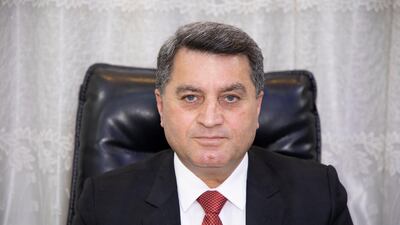The Kurdish-led administration in the north-east of Syria says that bringing the country’s civil war to a negotiated end is essential to ensuring a lasting victory over ISIS.
"Finding a political solution to the Syrian crisis is the only way we can defeat ISIS permanently," said the Kurdish administration's top foreign affairs official, AbdulKarim Omar.
Mr Omar was speaking to The National in the northern city of Qamishli, days before his group declared the military defeat of ISIS.
Since 2012, Syrian Kurds have led a governance project in the north-east of Syria.
The Autonomous Administration of North-East Syria has protected areas under its control from much of the bloodshed that has plagued the rest of the country.
The militia it leads, the Kurdish-Arab Syrian Democratic Forces, received US backing in its fight against ISIS.
After major victories against the extremists in Manbij, Raqqa, Tabqa and in Deir Ezzor province, the administration now holds unofficial control over about a third of Syria.
It has an uneasy relationship with the Syrian government. Enclaves of regime-held territory exist in several north-eastern Syrian cities, including Qamishli, and some government salaries are still paid by Damascus.
But Syrian President Bashar Al Assad and his Russian backers are opposed to the federalised autonomy proposed by the group, which draws its inspiration from Abdullah Ocalan, founder of the outlawed Kurdistan Workers’ Party, who is imprisoned in Turkey.
“The Syrian regime was and is not serious about solving Syria’s crisis,” Mr Omar said. “We can see this from Bashar’s last speech where he said there will be no change to the Syrian constitution.”
In February, Mr Al Assad said he would not bargain over the country’s constitution after Russia convened a congress, giving the UN envoy for Syria the job of forming a committee to draft a new one.
The process was meant to lead to new elections but it stalled after Mr Al Assad said Turkish-backed rebels selected for the committee were foreign agents.
“He wants to be back to 2011 with full control over all of Syria and all of its security and military services,” Mr Omar said.
“Because the regime is not ready to change, we call on the international community to help implement UN resolution 2254 and the Geneva process.”
The 2015 Security Council resolution called for a ceasefire and political settlement in Syria.
Repeated talks in Geneva have failed to produce results, while the UN special envoy for Syria, Norwegian Geir Pedersen, replaced Staffan de Mistura in January, becoming the fourth negotiator trying to end almost eight years of conflict.
Meanwhile, talks backed by Russia and Iran, and opposition supporter Turkey in Kazakhstan’s capital Astana have overshadowed the Geneva talks.
Without a political settlement, Syria is likely to remain a safe haven for terrorists, Mr Omar said.
“The main reason for people to cling to ISIS was the political vacuum in Syria," he said.
"It allowed terrorism to grow. People from 49 countries came and imposed a tyrannical rule on the people here.”
Now that the fighting is over, the SDF is focused on sleeper cells, what to do with the thousands of ISIS supporters it is stuck with and how to counter the group’s ideology.
The SDF says that 66,000 people fled the last ISIS enclave of Baghouz since January, among them 5,000 ISIS fighters and 24,000 of their relatives.
More than 9,000 foreigners are believed to be among them, including 6,500 children, and most are being held in the overcrowded Al Hol camp.
Mr Omar said his administration was bearing the costs of housing them: “We’re talking millions of dollars.”
But so far many governments have so been reluctant to repatriate their citizens.
“Those ISIS people – prisoners, their families and kids – don’t let the world think that if they’re held here they’re not a problem for the rest of the world,” Mr Omar said.
“Huge numbers of kids need rehabilitation. If not, they are ticking time bombs.”
The administration is now focused on reopening critical infrastructure in areas that were under ISIS control.
“We think we can go to these areas and win them over by rebuilding things like schools,” Mr Omar said. “The Civil Council of Deir Ezzor has seen 125,000 students return to school. They are paying the salaries of 5,700 teachers.”
The administration espouses localised autonomy on a regional level.
“After the SDF liberates, the civil councils begin working immediately to open schools and get people doing their job,” Mr Omar said. “The councils manage themselves and their members are drawn from that local population.”
There are no accurate estimates for the cost of rebuilding cities such as Raqqa, the eastern city that was once the capital of the ISIS “caliphate” that now lies in ruins.
“We’re talking billions, though,” Mr Omar said. “It’s completely destroyed. If we don’t provide services there the atmosphere for breeding terrorism will emerge again.”
But the group lacks the funds needed for serious reconstruction.
“We’re building a new Syria, one that is democratic, secular, decentralised," Mr Omar said. "A place where dictatorship will not be back again. And we’re cutting the road in front of terrorism.
“But we need international help.”

